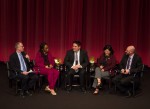Law professors said they expect the 2020 elections to have a higher voter turnout due to a rise in new voting technologies and reforms that make the voting process more inclusive and enable more people to register to vote and cast ballots.
The event, which was hosted at the Hammer Museum on Thursday evening, discussed the logistics of voting and incidences of voter suppression and negligence of polling booths and technologies in the 2018 election.
The panel was moderated by Rick Hasen, a UC Irvine political science and law professor. Hasen divided the panel into three main topics: election administration, redistricting and gerrymandering, and money in politics.
Justin Levitt, a professor at Loyola Law School, said he would give the U.S. election system a grade of a B-.
“If you believe as I do that we should be building a system that accommodates every right and opportunity and expectation that every eligible American would participate, we have a very long way to go,” Levitt said.
Levitt added that barely 50 percent of eligible American voters participated in the 2018 midterm elections and barely 60 percent voted in the 2016 presidential election.
Kathay Feng, executive director of California Common Cause, a political advocacy organization, said it is much harder to vote in the United States, as she thinks voting has become highly weaponized and politicized.
“In California, in 2020 there is going to be a change in the very way in how we run elections, certainly in Los Angeles,” Feng said.
Feng said Los Angeles County will be implementing voter centers, which will allow people to vote anywhere in the county rather than being tied to a particular polling location. She added that these centers will feature same-day voting registration and new voting systems, currently being developed by LA County.
She added that the U.S. also struggles with voter fraud, which prevents people from registering to vote and turning in ballots on time.
“Voter suppression refers to when lawful voters are denied the right to cast their ballot, whereas voter fraud or vote rigging is when people take someone else’s identity to vote for a favored candidate, ultimately increasing the chances for a particular candidate to win,” Feng said.
Franita Tolson, a USC law professor said voter fraud is very rare, but it discourages people from registering to vote because they believe fraud occurs more often than it does.
“Voter fraud is rare and it doesn’t really happen,” Tolson said. “A big part of our system is when voters believe our system is working.”
However, Tolson said, she thinks future elections will become more inclusive. She added that she predicts the 2020 elections will be more inclusive with more people participating in elections than in previous years.
Ella Montouri, a fourth-year political science student, said she was concerned about getting more students to participate in the next election.
“Looking at the disaster of voting at UCLA this past election, it directly impacts us, especially with students. It is so hard to get students to register to vote before elections,” Montouri said.
Montouri, who worked on student voter campaigns, said she believes UCLA needs encourage more students to vote, especially on campus.
Tolson added that she believes the only way to get more students to vote is to have civically engaged young voters spread awareness of the importance of voting to their peers.
“Students don’t feel like it matters. … It starts with young people,” Tolson said. “The only way we can get young people to vote is if young people can convince other young people that voting is worthwhile.”
